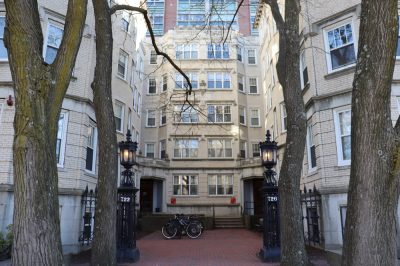Student residents at 726 Commonwealth Ave. raised concerns about possible asbestos after noticing a warning sign, and the University Environmental Health and Safety division tested possible materials and reported them as non-asbestos containing.

Lucy Godinez, a sophomore in the College of Arts and Sciences and a resident in the White Stones, said the construction work in her neighboring apartment had been happening for about a week before the residents received notice.
“I came home and I see a sign saying ‘Danger, Asbestos’ in the room next to us, and this was kind of concerning,” Godinez said. “I asked the workers about it, and they said that the asbestos was in a small fraction and to not worry about it.”
Godinez said she was worried about the risk of exposure to asbestos as her room and the one undergoing construction were the only two units in the basement floor.
“I was scared that through the ceiling or through the pipes, the air would be circulating around us,” Godinez said.
Clifton Johnson, a junior in CAS and the resident assistant for the White Stones, said he was not made aware of the asbestos located in the basement of the building along with his residents.
“As the RA I’m kind of responsible for everyone in the building,” Johnson said. “My main concern with the situation is that I’m the RA for this building, but I didn’t hear about it from someone who works at the school.”
Godinez said she decided to file a complaint to Boston University Residence Life to discuss her questions and concerns and sent the email on March 24.
“So we contacted housing immediately about our concerns,” she said. “A carpenter [said] we should have been notified earlier since this could be a big issue.”
Godinez said ResLife responded by stating that residents in the unit that needed construction were relocated. Reslife was addressing other students’ concerns to the best of their ability and would contact residents with updates.
“We moved the residents of the space to a temporary location, as the work that would have to be done to fix the issue and make all necessary repairs would be both invasive and extensive, taking at least a three week period of time,” Residence Hall Director for 1019 Commonwealth ave. Jordanne Miller wrote in the email to the residents.
Miller wrote that she was in charge of “residential facilities related matters across campus” at the time the email was sent, as Jason Grochowalski, associate director for ResLife, was out for the week.
BU spokesperson Colin Riley said the construction was to address a water leak in the unit, and workers found out the construction should be done beneath the floorboards.
“It’s presumed when you go into do work in an older building that has tiles that were put on the floor with the glue, and the glue may have [asbestos] in it,” Riley said. “So you get a project monitoring consultant, you follow state regulations [and] you coordinate with the Environmental Health and Safety team at BU.”
According to the United States Environmental Protection Agency (EPA), asbestos is a carcinogenic mineral fiber located in rock and soil that is used in many manufacturing goods, including building materials. Asbestos fibers become dangerous after being disturbed, causing the material to be released into the air.
Raphael Bueno, the chief of Thoracic Surgery and Cardiac Surgery at the Brigham and Women’s Hospital, said asbestos exposure can cause inflammation in the lung and plaques in the furrow which can cause restriction of the ability to breathe and cause respiratory disorders.
Bueno also stated that people who are exposed to a large amount of asbestos could increase the risk of having the rare disorder mesothelioma, which is a cancer.
“They have a slightly increased chance of developing an illness and if they have a family history of someone developing disease due to asbestos exposure, they’re presumably at higher risk,” he said.
Godinez said she asks for the University to be more understanding and communicative with students about health-related construction efforts in the future.
“We feel like our concerns aren’t being heard because this matter doesn’t seem serious to them,” Godinez said. “Because of the communication that we’ve been experiencing, I’m just hesitant to ask additional questions as well as asking [for] asbestos tests in our apartment because it feels like it would not follow through.”
Riley said that he values the initiative the students took to get answers from the University.
“We appreciate students asking questions, raising those concerns, we’re happy to explain them as we are able,” Riley said. “We need to really relocate the residents and once they were in there, EHS looked and said there was no hazardous material.”




















































































































